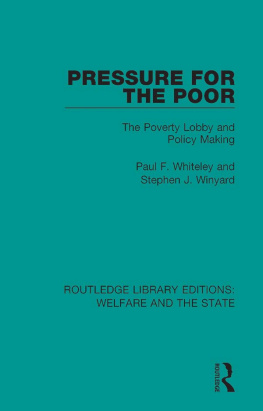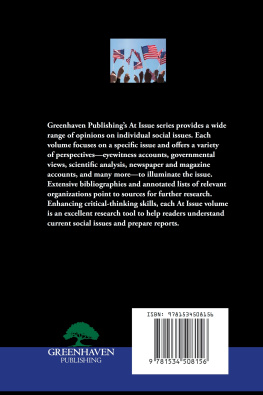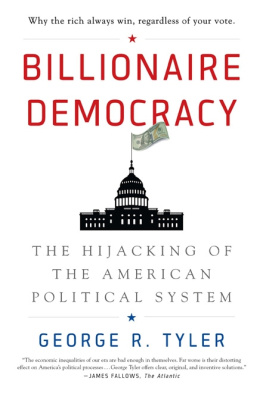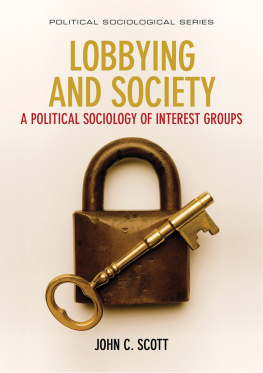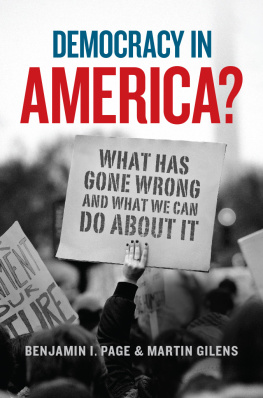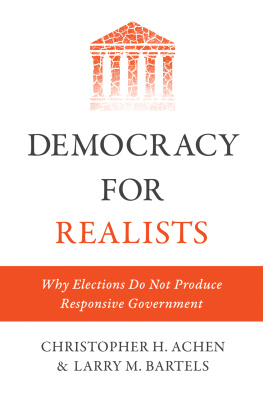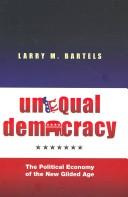Affluence and Influence
Affluence and Influence
ECONOMIC INEQUALITY AND POLITICAL
POWER IN AMERICA
Martin Gilens

Copyright 2012 by Princeton University Press and the Russell Sage Foundation Requests for permission to reproduce material from this work should be sent to Permissions, Princeton University Press
Published by Princeton University Press, 41 William Street, Princeton, New Jersey 08540 In the United Kingdom: Princeton University Press, 6 Oxford Street, Woodstock, Oxfordshire OX20 1TW
press.princeton.edu
Russell Sage Foundation, 112 East 64th Street, New York, New York 10065
russellsage.org
Jacket illustration: Hands/Money/Hat created by Jim Cherry. Courtesy of Images.com/Corbis
All Rights Reserved
Library of Congress Cataloging-in-Publication Data
Gilens, Martin.
Affluence and influence : economic inequality and political power in America / Martin Gilens.
p. cm.
Includes bibliographical references and index.
ISBN 978-0-691-15397-1 (hardcover : alk. paper) 1. Political planningUnited States. 2. Decision makingUnited States. 3. EqualityUnited States. 4. Representative government and representationUnited States. 5. Pressure groupsUnited States.
I. Title.
JK468.P64G55 2012
British Library Cataloging-in-Publication Data is available
This book has been composed in Sabon
Printed on acid-free paper.
Printed in the United States of America
1 3 5 7 9 10 8 6 4 2
was previously published as Two-thirds full? Citizen Competence and Democratic Governance. Copyright 2011. From New Directions in Public Opinion by Martin Gilens, edited by Adam J. Berinsky. Reproduced by permission of Taylor and Frances Group, LLC, a division of Informa plc.
was previously published in Gilens, Martin. Policy and Consequences of Representational Inequality. In Who Gets Represented? 2011 Russell Sage Foundation, 112 East 64th Street, New York, NY 10065. Reprinted with Permission.
To Janet, and to Naomi and Josh
Who brighten my life every day
Contents
CHAPTER 1
Citizen Competence and Democratic Decision Making
CHAPTER 2
Data and Methods
CHAPTER 3
The Preference/Policy Link
CHAPTER 4
Policy Domains and Democratic Responsiveness
CHAPTER 5
Interest Groups and Democratic Responsiveness
CHAPTER 6
Parties, Elections, and Democratic Responsiveness
CHAPTER 7
Democratic Responsiveness across Time
CHAPTER 8
Money and American Politics
List of Tables
List of Figures
Acknowledgments
DEMOCRACY SEEMS LIKE A SIMPLE IDEA: that government policy should reflect the preferences of the governed. But thousands of years of theorizing and decades, if not centuries, of empirical study have revealed the enormous complexities that this seemingly simple idea contains.
This book also started out as a seemingly simple idea: that the association between government policy and public preferences could tell us something important about the responsiveness of our government to the public and the extent to which political influence is reserved for the affluent. But as the following pages reveal, the complexities contained in this idea also turned out to be substantial.
Although I have spent neither decades nor centuries pursuing this research, I have spent many years doing so and have accumulated many debts along the way, debts that I am happy to acknowledge here. The inspiration for this project grew from the work of Alan Monroe, who was the first to assess democratic representation by relating public preferences to government policy outcomes across large numbers of issues. Although Alan did not examine inequalities in responsiveness to different subgroups of the public, he encouraged my plans to do so, and that was all it took to set me off down the path that led, many years later, to the book you are now reading.
I began thinking about this project while I was at Yale in the 1990s, and it blossomed into a serious research effort when I moved to UCLA in 2000. I was fortunate to have wonderful colleagues in both departments who inspired by example and created supportive and stimulating environments for pursuing this work. I am especially grateful to my Yale colleagues Alan Gerber, Donald Green, Eric Patashnik, and Rogers Smith and my UCLA colleagues David Sears, Lynn Vavreck, and John Zaller for their friendship, encouragement, and advice.
In 2003 I left UCLA for Princeton. Princeton has a large and diverse group of scholars with interests in politics and inequality, and my research has benefited greatly from comments and suggestions from my colleagues Chris Achen, Doug Arnold, Larry Bartels, Chuck Cameron, Brandice Canes-Wrone, Fred Greenstein, Kosuke Imai, Steve Macedo, Nolan McCarty, Devah Pager, Betsy Paluck, Markus Prior, Tali Mendelberg, Kathy Newman, and Jonas Pontusson. Also at Princeton I was fortunate to take advantage of the many benefits provided by the Center for the Study of Democratic Politics, and I am grateful to CSDP director Larry Bartels and to CSDP staff Michele Epstein and Helene Wood for creating such a wonderfully warm and intellectually enriching environment.
Feedback from far-flung scholars and interested laypeople has greatly enhanced the quality of this research (and perhaps slowed its completion as I pursued many of the excellent suggestions I received along the way). I am grateful to seminar discussants and participants at Cornell, Columbia, Harvard, Michigan, MIT, Rutgers, Temple, and Yale universities and to the Russell Sage Foundation (which sponsored the 2008 Conference on Homogeneity and Heterogeneity in Public Opinion at Cornell University) and the Tobin Project in Cambridge, Massachusetts (which sponsored the 2010 Conference on Democracy and Markets). Through these presentations, and in other conversations, I have received helpful comments and useful data from Dennis Barr, Sarah Binder, Will Bullock, Ted Carmines, Nick Carnes, Kevin Collins, Peter Enns, Michele Epstein, Janet Felton, Alan Gerber, Josh Gilens, Naomi Gilens, Jim Glaser, Marissa Golden, Jacob Hacker, Will Howell, Larry Jacobs, Beth Leech, Michael Malbin, George Marcus, Lynda Powell, Wendy Rahn, Elizabeth Rigby, Tom Romer, Theda Skocpol, Sidney Verba, Chris Wlezien, Jerry Wright, and John Zaller.
I have been especially fortunate to have had the extensive help and support of Kay Schlozman, Ben Page, and Larry Bartels, and all of whom read the entire manuscript and offered scores of helpful suggestions. Kay is an expert in the study of interest groups and served as a valuable guide on a topic that I had little familiarity with when I began this research. Ben has long been both an ardent supporter and a valued critic of this work, and I am deeply grateful for the time and thought he has so generously given. Larry is an extraordinarily talented political scientist and an extraordinarily generous colleague. His own research on inequality and democracy has inspired me, and his unfailing helpfulness in talking through one or another issue in my own workwhether of statistical methodology, substantive argument, or clarity of presentationhas been hugely helpful.
A project of this magnitude requires a virtual army of research assistants. It would have been impossible to collect the thousands of survey questions from dozens of different organizations over four decades, and to code the policy outcomes and interest-group alignments associated with each, without the able assistance of Marty Cohen, Jason Conwell, Andrea Vanacore, and Mark West at UCLA, and Oleg Bespalov, Daniel Cassino, Kevin Collins, Shana Gadarian, Raymond Hicks, and Lee Shaker at Princeton.
Next page

